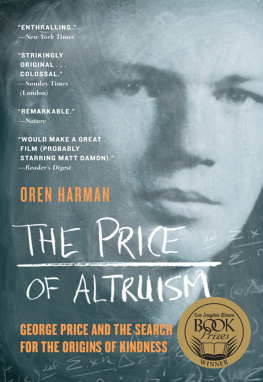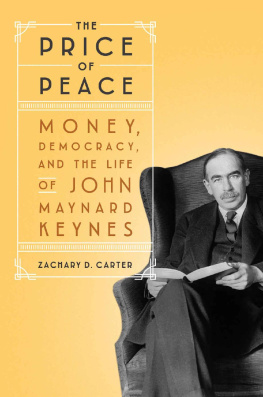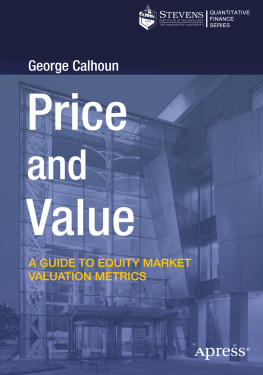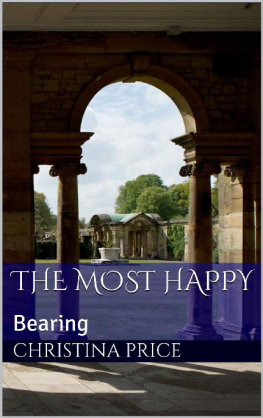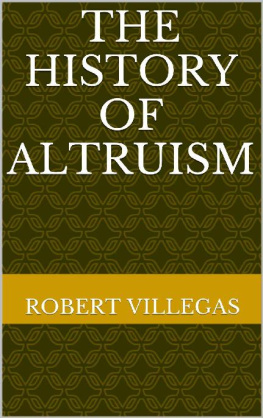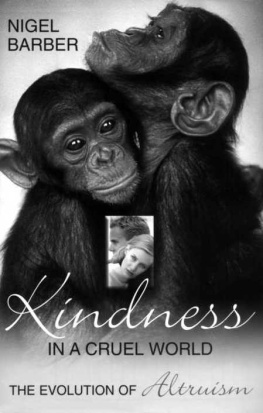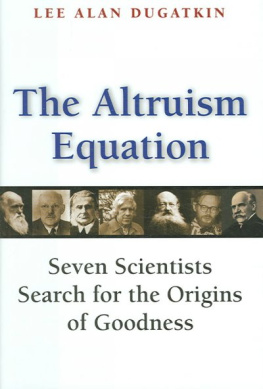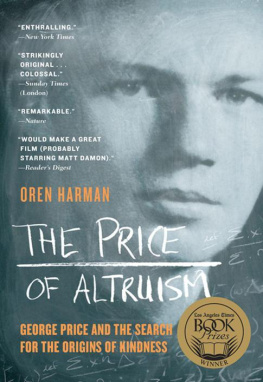The PRICE of ALTRUISM
George Price and the Search for the Origins of Kindness
OREN HARMAN

W. W. NORTON
NEW YORK LONDON
Copyright 2010 by Oren Harman
All rights reserved
Photograph credits: frontmatter, Library of Congress; part 1 (Kropotkin), Library of
Congress; chapter 1 (George and Edison Price), courtesy of the Price family; chapter 1
(George, Alice, and Edison Price), courtesy of the Price family; chapter 2 (Fisher),
Library of Congress; chapter 2 (Haldane), Raphael Falk; chapter 3 (George and Julia Price),
courtesy of the Price family; chapter 3 (Price family), courtesy of the Price family;
chapter 4 (von Neumann), Library of Congress; chapter 4 (Allee), University of Chicago
Library; chapter 5, Minneapolis Star Tribune ; chapter 6 (Smith), University of Sussex;
chapter 6 (Hamilton), Photo Researchers, Inc.; chapter 7, courtesy of the Price family; part 2, Oren Harman; chapter 9, Nature ; chapter 10, courtesy of the Price family;
chapter 11, courtesy of the Price family; chapter 12, Owen Gilbert; chapter 13, courtesy of the Price family; chapter 14, Oren Harman.
For information about permission to reproduce selections from this book,
write to Permissions, W. W. Norton & Company, Inc.,
500 Fifth Avenue, New York, NY 10110
Library of Congress Cataloging-in-Publication Data
Harman, Oren Solomon.
The price of altruism: George Price and the search for the origins of kindness / Oren
Harman.1st American ed.
p. cm.
Includes bibliographical references.
ISBN: 978-0-393-07923-4
1. Price, George Robert, 19221975. 2. GeneticistsUnited StatesBiography.
3. GeneticistsGreat BritainBiography. 4. ScientistsUnited StatesBiography.
5. ScientistsGreat BritainBiography. 6. Population genetics.
7. Altruistic behavior in animals. I. Title.
QH429.2.P75H37 2010
576.5092dc22
[B]
2010011934
W. W. Norton & Company, Inc.
500 Fifth Avenue, New York, N.Y. 10110
www.wwnorton.com
W. W. Norton & Company Ltd.
Castle House, 75/76 Wells Street, London W1T 3QT
To Danzi and Mishy with love
Contents
The PRICE of ALTRUISM

Charles Darwin (18091882)
Prologue
T he men ducked out of the rain into the modest Saint Pancras Cemetery chapel. It was a bleak London day, January 22, 1975. The chapel was spare, its simple pews and white ceiling and walls giving it the feel of a rather uninspiring classroom. Soon theyd follow the hearse down a short path to the burial plot on East Road, where in an unmarked grave the body of the deceased would be laid to rest.
A middle-aged man with a scraggly beard shuffled through the heavy wooden door beneath the ragstone spire, his nose red from whiskey and eyes swollen from fatigue. Hed been in and out of prison, destitute, hard on luck. A big toe jutted from torn sneakers, its nail uncut and covered in grime. Life had not smiled on Smoky. The only person whod ever truly cared for him was George.
The bearded man was followed into the chapel by four other homeless men, the dead mans final companions, all bundled up in discarded sweaters and scarves found in trash-bins and at the shelterstoo small, belonging once to unknown strangers, but welcome protectors from the bitter cold. Some wore belts and socks that George had kindly given them, others pants and overcoats for which he had generously provided the coin. Hed been a true saint, one of them muttered, holding back tears as he passed a few solitary University of London geneticists sitting uncomfortably in silence. A distinct stench of urine followed the ragtag party as it made its way toward the front of the chapel where the coffin lay. There were ten people in the room, maybe eleven. It was a glum ending to a glum affair.
And there, at the front of the chapel, stood the worlds two premier evolutionary biologists, brilliant men and silent rivals. George took his Christianity too seriously, said Mr. Apps, administering the ceremony on behalf of Garstin Funeral Directors in the absence of any family. Sort of like Saint Paul, Bill Hamilton whispered audibly under his breath, forcing John Maynard Smith to bite his lip. Then there was a silence. George Price had come over from America to crack the problem of altruism and uncovered something terrible. Now he was dead, the victim of his own hand.
From the dawn of time mankind has been contemplating virtue. It began with an act of trickery: then your eyes shall be opened, the snake whispers to Eve in the Garden of Eden, coaxing her to eat of the fruit, and ye shall be as gods, knowing good and evil. But if judgment had replaced innocence by way of conniving, it didnt take long before the hard questions arrived. Soon Cain rose up against his brother Abel, killing him to tame his envy. When the Lord came asking for Abels whereabouts, Cain answered: Am I my brothers keeper? It was a question that would reverberate down the paths of history, becoming a haunting companion to humanity.
Then came Darwin.
The devout believed that morality was infused from above on the Sixth Day, religious skeptics that it had been born with philosophy. Now both would need to reexamine their timelines. He who understands baboon, the sage of evolution scribbled in a notebook, fore-shadowing what was to come, would do more towards metaphysics than Locke.
It was like confessing a murder. If, as the Scottish geologist James Hutton wrote toward the end of the eighteenth century, the earth was so ancient that we find no vestige of a beginningno prospect of an end if, as Darwin himself argued, life on earth had evolved gradually, over eons, and, far from a ladder was more like a tree; if, just like muscles and feathers and claws and tails, behavior and the mind had been fashioned by natural selectionif all these were true, it would be inconceivable to continue believing that mans defining feature was entirely unique. Whether life had been originally breathedinto a few forms or one by a Creator, as Darwin suggested, bowing before popular sentiment in the second edition of The Origin of Species after leaving him out of the first, virtue was no kind of human invention. More ancient than the Bible, still earlier than philosophy, morality was in fact older than Adam and Eve.
Why do amoebas build stalks from their own bodies, sacrificing themselves in the process, so that some may climb up and be carried away from dearth to plenty on the legs of an innocent insect or the wings of a felicitous wind? Why do vampire bats share blood, mouth to mouth, at the end of a night of prey with members of the colony who were less successful in the hunt? Why do sentry gazelles jump up and down when a lion is spotted, putting themselves precariously between the herd and hungry hunter? And what do all of these have to do with morality in humans: Is there, in fact, a natural origin to our acts of kindness? Does the virtue of amoebas and bats and gazelles and humans come from the very same place?
Altruism was a puzzle. It stood blatantly opposed to the fundamentals of the theory, an anomalous thorn in Darwins side. If Nature was bloody in tooth and claw, a ruthless battle fiercely fought beneath the waves and through the skies and in the deserts and the jungles, how could a behavior that lowered fitness be selected? Survival of the fittest or survival of the nicest: It was a conundrum the Darwinians would need to solve.
And so, starting with Darwin, the quest to solve the mystery of altruism began. It traveled far and wide: From the Beagle in the southern seas to the court of the Russian czar Alexander II to the chambers of Londons Royal Society; from economics lecture halls at the University of Chicago to Senate hearing rooms on Capitol Hill; from Indiana prairies to Brazilian jungles to Jamaican mountains; from World War I trenches to antiVietnam War demonstrations, Marxist manifestos to Anglican proclamations, Quaker pacifications to Nazi heresies. Some argued that man was all of a part with Nature, bound by his animal beginnings, others that his intelligence rendered him uniquely transcendent. Some championed a return to origins, others the clawing climb of culture away from them, still others an uneasy marriage between the two. Emphatic and zealous, each saw the problem from where they were standing, sometimes translating prior commitments about whats right and wrong directly onto nature. And so the quest remained far from complete. As we shall see, 150 years after Darwin it continues just as passionately.

